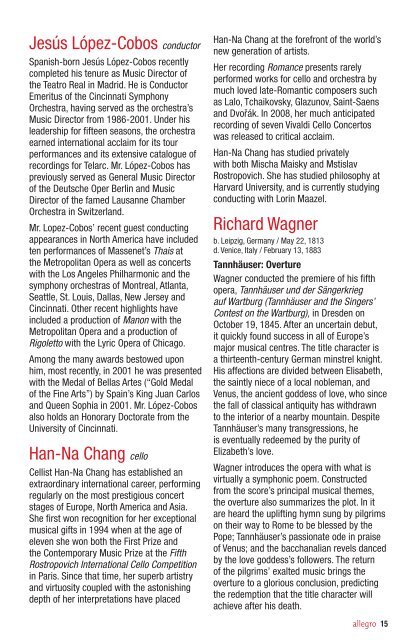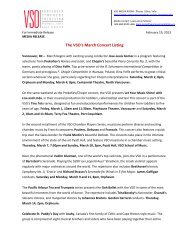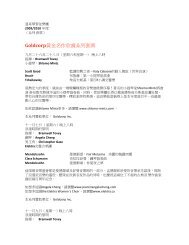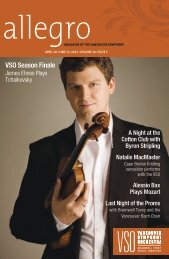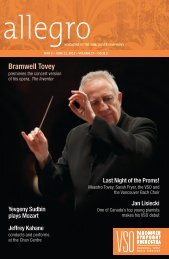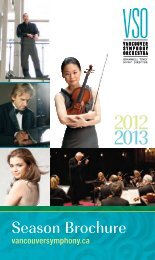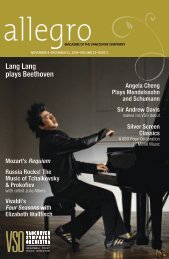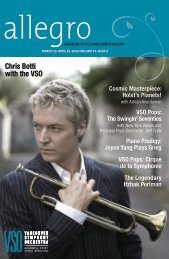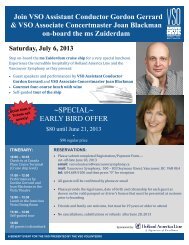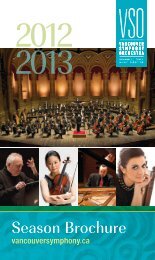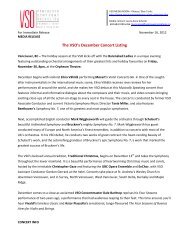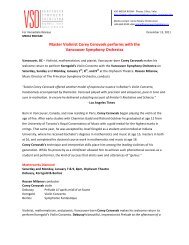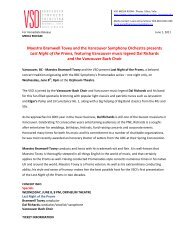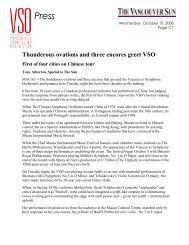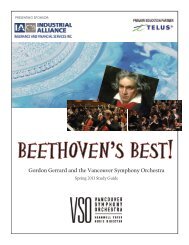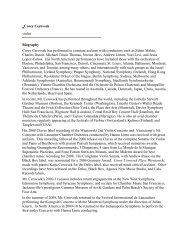issue one - Vancouver Symphony Orchestra
issue one - Vancouver Symphony Orchestra
issue one - Vancouver Symphony Orchestra
You also want an ePaper? Increase the reach of your titles
YUMPU automatically turns print PDFs into web optimized ePapers that Google loves.
Jesús López-Cobos conductor<br />
Spanish-born Jesús López-Cobos recently<br />
completed his tenure as Music Director of<br />
the Teatro Real in Madrid. He is Conductor<br />
Emeritus of the Cincinnati <strong>Symphony</strong><br />
<strong>Orchestra</strong>, having served as the orchestra’s<br />
Music Director from 1986-2001. Under his<br />
leadership for fifteen seasons, the orchestra<br />
earned international acclaim for its tour<br />
performances and its extensive catalogue of<br />
recordings for Telarc. Mr. López-Cobos has<br />
previously served as General Music Director<br />
of the Deutsche Oper Berlin and Music<br />
Director of the famed Lausanne Chamber<br />
<strong>Orchestra</strong> in Switzerland.<br />
Mr. Lopez-Cobos’ recent guest conducting<br />
appearances in North America have included<br />
ten performances of Massenet’s Thais at<br />
the Metropolitan Opera as well as concerts<br />
with the Los Angeles Philharmonic and the<br />
symphony orchestras of Montreal, Atlanta,<br />
Seattle, St. Louis, Dallas, New Jersey and<br />
Cincinnati. Other recent highlights have<br />
included a production of Manon with the<br />
Metropolitan Opera and a production of<br />
Rigoletto with the Lyric Opera of Chicago.<br />
Among the many awards bestowed upon<br />
him, most recently, in 2001 he was presented<br />
with the Medal of Bellas Artes (“Gold Medal<br />
of the Fine Arts”) by Spain’s King Juan Carlos<br />
and Queen Sophia in 2001. Mr. López-Cobos<br />
also holds an Honorary Doctorate from the<br />
University of Cincinnati.<br />
Han-Na Chang cello<br />
Cellist Han-Na Chang has established an<br />
extraordinary international career, performing<br />
regularly on the most prestigious concert<br />
stages of Europe, North America and Asia.<br />
She first won recognition for her exceptional<br />
musical gifts in 1994 when at the age of<br />
eleven she won both the First Prize and<br />
the Contemporary Music Prize at the Fifth<br />
Rostropovich International Cello Competition<br />
in Paris. Since that time, her superb artistry<br />
and virtuosity coupled with the astonishing<br />
depth of her interpretations have placed<br />
Han-Na Chang at the forefront of the world’s<br />
new generation of artists.<br />
Her recording Romance presents rarely<br />
performed works for cello and orchestra by<br />
much loved late-Romantic composers such<br />
as Lalo, Tchaikovsky, Glazunov, Saint-Saens<br />
and Dvořák. In 2008, her much anticipated<br />
recording of seven Vivaldi Cello Concertos<br />
was released to critical acclaim.<br />
Han-Na Chang has studied privately<br />
with both Mischa Maisky and Mstislav<br />
Rostropovich. She has studied philosophy at<br />
Harvard University, and is currently studying<br />
conducting with Lorin Maazel.<br />
Richard Wagner<br />
b. Leipzig, Germany / May 22, 1813<br />
d. Venice, Italy / February 13, 1883<br />
Tannhäuser: Overture<br />
Wagner conducted the premiere of his fifth<br />
opera, Tannhäuser und der Sängerkrieg<br />
auf Wartburg (Tannhäuser and the Singers’<br />
Contest on the Wartburg), in Dresden on<br />
October 19, 1845. After an uncertain debut,<br />
it quickly found success in all of Europe’s<br />
major musical centres. The title character is<br />
a thirteenth-century German minstrel knight.<br />
His affections are divided between Elisabeth,<br />
the saintly niece of a local nobleman, and<br />
Venus, the ancient goddess of love, who since<br />
the fall of classical antiquity has withdrawn<br />
to the interior of a nearby mountain. Despite<br />
Tannhäuser’s many transgressions, he<br />
is eventually redeemed by the purity of<br />
Elizabeth’s love.<br />
Wagner introduces the opera with what is<br />
virtually a symphonic poem. Constructed<br />
from the score’s principal musical themes,<br />
the overture also summarizes the plot. In it<br />
are heard the uplifting hymn sung by pilgrims<br />
on their way to Rome to be blessed by the<br />
Pope; Tannhäuser’s passionate ode in praise<br />
of Venus; and the bacchanalian revels danced<br />
by the love goddess’s followers. The return<br />
of the pilgrims’ exalted music brings the<br />
overture to a glorious conclusion, predicting<br />
the redemption that the title character will<br />
achieve after his death.<br />
allegro 15


